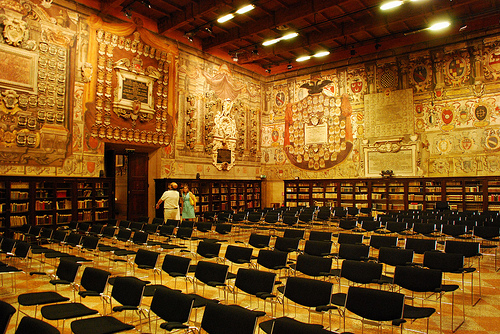The oldest University of the world

The University of Bologna is considered the oldest university in the Western world. The date of its foundation was set conventionally on 1088. The founder is considered Irnerio, died allegedly after 1125. It consists of 11 schools and 33 departments and in the academic year 2012/13 has hosted about 90,000 students.
According to the world ranking of universities QS World University Rankings, the University of Bologna is the first Italian universities and 182ª in the world. Also appears to be the Italian university mostly chosen by the students of the Erasmus Project, with approximately 1,700 admissions in 2013.
The high number of students from all over Italy and the world has a significant impact making Bologna a lively the city.
The oldest university in the Western world, the Studium, was born as a free and laic organization among students who chose and financed the best teachers through a system of collecting donations (collectio). They were organized in colleges for the mutual help of students of the same nationality (nationes).
As evidence of this, in the palace of Archiginnasio (which was the seat of the University from 1563), is a complex of nearly 6000 student coats-of-arm, the largest in the world.
It is also active even today the outstanding College of Spain, certainly the most famous of the many reasonable between the thirteenth and seventeenth century.
The origin of the University took place in a meeting happened in the XI century of distinguished legal scholars, called glossators, who were called to review the ancient codes of Roman Law.
The first studies were focused on the laws and one of the first scholars we have documentation are Pepone, Irnerius and Graziano (author of Concordantia discordantium canonum first manual of Canon Law).
In 1158 Federico Barbarossa promulgated the Constitutio Habita, in which the University was protected as a place of research and study independent of any other political power.
From the fourteenth century were added to the legal scholars also logic, astronomy, medicine, philosophy, mathematics, rhetoric, grammar and then theology, greek and Hebrew.
Source: Wikipedia